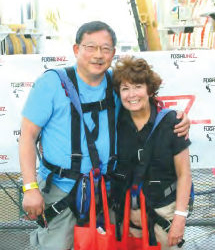 Christine and her husband, Tom Kudo, after riding the zip line in Las Vegas |
Cancer survivors are frequently asked, "When and how were you diagnosed with cancer, and how did you take the news?" I have my mother to thank for my rather swift diagnosis. Hopefully, a cure will be found during my lifetime; but if not, I want to help ensure that progress toward a cure continues for the next generation of patients—which is why I have left a planned gift to the MMRF in my will.
In March 2006 my mother had emergency heart surgery. The day after her operation, I observed her to be very frail and uncommunicative. I was gravely concerned for her, and it made me think about my own mortality and health issues. I knew I did not want to go through the same procedure.
Two months prior to my mother's ordeal, I could not walk up a flight of steps without becoming breathless and experiencing chest pain. I was also losing weight, but for someone who was always on a diet, this was not a major concern. After seeing many doctors, I learned that the good news was that my heart was functioning well; but after a bone marrow biopsy, it was determined I had stage 4 lambda light chain multiple myeloma. I was diagnosed on June 6, 2006.
Besides my oncologist in Charlotte, North Carolina, Dr. John Mahoney, I see Dr. Cristina Gasparetto at Duke Medical Center for my care. I received my first stem cell transplant in November 2006 and reached complete remission the following spring of 2007. Unfortunately, four years later, my blood work became abnormal again. Dr. Mahoney and Dr. Gasparetto believed I would benefit from a salvage transplant, so I began a three-month protocol of Velcade® as induction therapy prior to my second transplant.
I am happy to report that on March 12, 2014, I celebrated being two years out after transplant, and my only cancer medications are Revlimid® and monthly intravenous immunoglobulin (IVIG) infusions.
Throughout my journey as a multiple myeloma patient, the majority of my treatments were through clinical trials. Now some of those drugs are FDA-approved and benefiting numerous patients. I have benefited greatly through the incredible support of the MMRF as well as the organization's ability to act as the catalyst between pharmaceutical companies and the leading multiple myeloma centers to ensure promising novel clinical trials are available—and in some cases lead to an accelerated FDA approval.
Patients like me are living longer and enjoying a better quality of life as a result of the work the MMRF is doing to speed the development of new and better treatments and a cure for multiple myeloma. It is my responsibility as a patient to help provide support to the MMRF and to help it continue to remain a leader in providing cutting-edge cancer research and partnering with the best scientists, researchers, and clinicians to develop new lifesaving drugs.
© Pentera, Inc. Planned giving content. All rights reserved.
Disclaimer